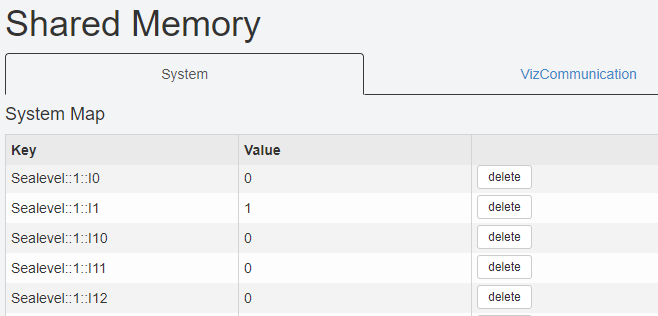
Viz Plug-ins User Guide
Version 5.0 | Published December 20, 2022 ©
viz_sealevel
The viz_sealevel plug-in allows Viz Engine to provide GPIO data coming from SeaLevel Devices for plug-ins and scripts.
Both SeaLevel PCI and ethernet Devices are supported. The GPIO data is provided in via SHM key/values and via message passing.
SHM Interface
Each GPIO pin is mapped to a SHM key.
Format
The pins are mapped with following format:
-
Inputs: Sealevel::<device-id>::I<pin-id>::<0 or 1>
-
Outputs: Sealevel::<device-id>::O<pin-id>::<0 or 1>
SMM Values in Viz Engine REST Interface

Inputs
These SHM values are only for reading and are updated when a input pin changes. By registering to SHM changes this can then be used to perform tasks in scripting or plug-ins.
Outputs
These values are meant to set from inside scripts or plug-ins (for example to switch lights on and off).
Message Interface
The Viz Engine plug-in API supports communication via message passing which is similar to a REST API. Messages can be send via Request(location, message) in Viz Script.
List Devices
Location: /Extensions/Sealevel/devices
Response:
[ { "id": "1", "name": "410io_", "status": "connected", "status-description": "Connected" }]Get Device Info
Location: /Extensions/Sealevel/devices/1
Response:
{ "id": "1", "name": "410io_", "status": "connected", "status-description": "Connected", "pins": [ { "id": "0", "is-input": true, "value": 0 }, { "id": "1", "is-input": true, "value": 0 }, { "id": "2", "is-input": true, "value": 0 }, { "id": "3", "is-input": true, "value": 0 },... ]}Register for Pin Changes
Location: /Extensions/Sealevel/devices/1/register
Response:
{ "error": false}If then a pin changes the script or plug-in would receive such a response:
Location: /Extensions/Sealevel/devices/1/change
Response:
{ "device": 1, "pin": 1, "value": true}Get All Pin Data for a Given Device
Location: /Extensions/Sealevel/devices/1/pins
Response:
[ { "id": "0", "is-input": true, "value": 0 }, { "id": "1", "is-input": true, "value": 0 }, { "id": "2", "is-input": true, "value": 0 }, ...]Get Pin Data for a Given Device and Pin
Location: /Extensions/Sealevel/devices/1/pins/0
Response:
{ "id": "0", "is-input": true, "value": 0}Set Pin Data for a Given Device and Pin
Location: /Extensions/Sealevel/devices/1/pins/0
Message:
{ "value": 1}Response:
{ "id": "0", "is-input": true, "value": 1}Configuration
To Configure this plugin create a file called {VizEngine-Config-dir}/extensions/Sealevel.json. This file is used for every running instance of Viz Engine. To have a specific config for a running instance you can create config files like {VizEngine-Config-dir}/extensions/Sealevel-{Instance-Number}.json.
Supported config parameters:
-
auto-reconnect: Automatically reconnect to device.
-
reconnect-interval: Interval for reconnecting.
-
discover-ethernet-devices: Automatically detect SeaLevel network devices.
-
ethernet-devices: Array of SeaMax devices connected via Ethernet.
-
address: IP address.
-
name: Assocciated name for this Card.
-
-
seaio-devices: Array of SeaIO device (PCI-Cards).
-
adapter: Adapter number for PCI-Card (For two installed PCI-Cards possible adapters would be 0 and 1).
-
name: Assocciated name for this Card.
-
-
serial-devices: Array of SeaMax devices connected via serial interface.
-
port: COM port for this device.
-
name: Assocciated name for this Card.
-
The Sealevel.json file would then look like this:
{ "auto-reconnect": true, "discover-ethernet-devices": true "ethernet-devices": [ { "port": "COM1", "name": "serial_card_0" } ], "reconnect-interval": 60000, "seaio-devices": [ { "adapter": 0, "name": "pci_card_0" } ], "serial-devices": [ { "port": "COM1", "name": "serial_card_0" } ]}Sample Scripts
List Devices
sub getDevices() Request("/Extensions/Sealevel/devices", "")end subsub onDevices(devices as Json) if devices.Size == 0 Then exit sub end if dim devCount as Integer = devices.Size - 1 for i = 0 to devCount dim deviceObj as Json = devices.At(i) Println(deviceObj.Dump()) Nextend subsub OnResponse(location as string, message as string) if location == "/Extensions/Sealevel/devices" Then dim j as Json j.Load(message) onDevices(j) end ifend subgetDevices()Get Pin Values
sub getPinValue(devId as String, pinId as String) Request("/Extensions/Sealevel/devices/" & devId & "/pins/" & pinId, "")end subsub OnResponse(location as string, message as string) dim j as Json j.Load(message) onPinValue(j.GetString("id"), j.GetInteger("value"))end subsub onPinValue(pinId as String, value as Integer) Println("Pin " & pinId & " value = " & value)end sub' Inputsfor i = 0 to 15 getPinValue("0", "" & i)next' Outputsfor i = 16 to 31 getPinValue("0", "" & i)nextSet Output Pins
sub getPinValue(devId as String, pinId as String) Request("/Extensions/Sealevel/devices/" & devId & "/pins/" & pinId, "")end subsub setPinValue(devId as String, pinId as String, value as Integer) dim payload as String = "{\"value\": " & value & "}" Request("/Extensions/Sealevel/devices/" & devId & "/pins/" & pinId, payload)end subsub OnResponse(location as string, message as string) dim j as Json j.Load(message) onPinValue(j.GetString("id"), j.GetInteger("value"))end subsub onPinValue(pinId as String, value as Integer) Println("Pin " & pinId & " value = " & value)end subsetPinValue("0", "16", 1)setPinValue("0", "18", 1)' Outputsfor i = 16 to 31 getPinValue("0", "" & i)nextListen for Pin Changes
sub OnResponse(location as string, message as string) if location.StartsWith("/Extensions/Sealevel/devices") and location.EndsWith("change") Then dim j as Json j.load(message) onPinChanged(j.GetInteger("pin"), j.GetInteger("value")) end ifend subsub onPinChanged(pinId as Integer, value as Integer) Println("Pin " & pinId & " changed to " & value)end subRequest("/Extensions/Sealevel/devices/0/register", "")